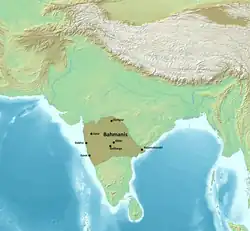The Bahmani Sultanate (c. 1347–1527 CE) was an Sunni Muslim kingdom that ruled the Deccan Plateau in Southern India.[1]

Maximum expansion of Bahmani Sultanate
The kingdom came to power in 1347 CE, when it was established by Zafar Khan. The Bahmani Sultanate shared border with neighboring rival Vijayanagara Empire.[2] The Sultanate would begin its decline under the reign of Mahmood Shah. In 1518, the Bahmani Sultanate split up into the Deccan sultanates, ending its 180-year rule over the Deccan.[3][4]
Family tree
| Bahmani dynasty | |||||||||||||||||||||||||||||||||||||||||||||||||||||||||||||||||||||||||||||||||||||||||||||||||||||||||||||||||||||||||||||||||||||||||||||||||||||||||||||||||||||||||||||||||||||||||||||||||||||||||||||||||||||||||||||||||||||||||||||||||||||||||||||||||||||||||||||||||||||||||||||||||||||||||||||||||||||||||||||||||||||||||||||||||||||||||||||||||||||||||||||||||||||||||||||||||||||||||||||||||||||||||||||||||||||||||||||||||||||||||||||||||||||||||||||||||||||||||||||||||||||||||||||||||||||||||||||||||||||||||||||||||||||||||||||||||||||||||||||||||||||||||||||||||||||||||||||||||||||||||||||||||||||||||||||||||||||||||||||||||||||||||||||||||||||||||||||||||||||||||||||||||||||||||||||||||||||||||||||||||||||||||||||||||||||||||||||||||||||||||||||||||||||||||||||||||||||||||||||||||||||||||||||||||||||||||||||||||||||||||||||||||||||||||||||||||||||||||||||||||||||||||||||||||||||||||||||||||||||||||||||||||||||||||||||||||||||||||||||||||||||||||||||||||||||||||||||||||||||||
|---|---|---|---|---|---|---|---|---|---|---|---|---|---|---|---|---|---|---|---|---|---|---|---|---|---|---|---|---|---|---|---|---|---|---|---|---|---|---|---|---|---|---|---|---|---|---|---|---|---|---|---|---|---|---|---|---|---|---|---|---|---|---|---|---|---|---|---|---|---|---|---|---|---|---|---|---|---|---|---|---|---|---|---|---|---|---|---|---|---|---|---|---|---|---|---|---|---|---|---|---|---|---|---|---|---|---|---|---|---|---|---|---|---|---|---|---|---|---|---|---|---|---|---|---|---|---|---|---|---|---|---|---|---|---|---|---|---|---|---|---|---|---|---|---|---|---|---|---|---|---|---|---|---|---|---|---|---|---|---|---|---|---|---|---|---|---|---|---|---|---|---|---|---|---|---|---|---|---|---|---|---|---|---|---|---|---|---|---|---|---|---|---|---|---|---|---|---|---|---|---|---|---|---|---|---|---|---|---|---|---|---|---|---|---|---|---|---|---|---|---|---|---|---|---|---|---|---|---|---|---|---|---|---|---|---|---|---|---|---|---|---|---|---|---|---|---|---|---|---|---|---|---|---|---|---|---|---|---|---|---|---|---|---|---|---|---|---|---|---|---|---|---|---|---|---|---|---|---|---|---|---|---|---|---|---|---|---|---|---|---|---|---|---|---|---|---|---|---|---|---|---|---|---|---|---|---|---|---|---|---|---|---|---|---|---|---|---|---|---|---|---|---|---|---|---|---|---|---|---|---|---|---|---|---|---|---|---|---|---|---|---|---|---|---|---|---|---|---|---|---|---|---|---|---|---|---|---|---|---|---|---|---|---|---|---|---|---|---|---|---|---|---|---|---|---|---|---|---|---|---|---|---|---|---|---|---|---|---|---|---|---|---|---|---|---|---|---|---|---|---|---|---|---|---|---|---|---|---|---|---|---|---|---|---|---|---|---|---|---|---|---|---|---|---|---|---|---|---|---|---|---|---|---|---|---|---|---|---|---|---|---|---|---|---|---|---|---|---|---|---|---|---|---|---|---|---|---|---|---|---|---|---|---|---|---|---|---|---|---|---|---|---|---|---|---|---|---|---|---|---|---|---|---|---|---|---|---|---|---|---|---|---|---|---|---|---|---|---|---|---|---|---|---|---|---|---|---|---|---|---|---|---|---|---|---|---|---|---|---|---|---|---|---|---|---|---|---|---|---|---|---|---|---|---|---|---|---|---|---|---|---|---|---|---|---|---|---|---|---|---|---|---|---|---|---|---|---|---|---|---|---|---|---|---|---|---|---|---|---|---|---|---|---|---|---|---|---|---|---|---|---|---|---|---|---|---|---|---|---|---|---|---|---|---|---|---|---|---|---|---|---|---|---|---|---|---|---|---|---|---|---|---|---|---|---|---|---|---|---|---|---|---|---|---|---|---|---|---|---|---|---|---|---|---|---|---|---|---|---|---|---|---|---|---|---|---|---|---|---|---|---|---|---|---|---|---|---|---|---|---|---|---|---|---|---|---|---|---|---|---|---|---|---|---|---|---|---|---|---|---|---|---|---|---|---|---|---|---|---|---|---|---|---|---|---|---|---|---|---|---|---|---|---|---|---|---|---|---|---|---|---|---|---|---|---|---|---|---|---|---|---|---|---|---|---|---|---|---|---|---|---|---|---|---|---|---|---|---|---|---|---|---|---|---|---|---|---|---|---|---|---|---|---|---|---|---|---|---|---|---|---|---|---|---|---|---|---|---|---|---|---|---|---|---|---|---|---|---|---|---|---|---|---|---|---|---|---|---|---|---|---|---|---|---|---|---|---|---|---|---|---|---|---|---|---|---|---|---|---|---|---|---|---|---|---|---|---|---|---|---|---|---|---|---|---|---|---|---|---|---|---|---|---|---|---|---|---|---|---|---|---|---|---|---|---|---|---|---|---|---|---|---|---|---|---|---|---|---|---|---|---|---|---|---|---|---|---|---|---|---|---|---|---|---|---|---|---|---|---|---|---|---|---|---|---|---|---|---|---|---|---|---|---|---|---|---|---|---|---|---|---|---|---|---|---|---|---|---|---|---|---|---|---|---|---|---|---|---|---|---|---|---|---|---|---|---|---|---|---|---|---|---|---|---|---|---|---|---|---|---|---|---|---|---|---|---|---|---|---|---|---|---|---|---|---|---|---|---|---|---|---|---|---|---|---|---|---|---|---|---|---|---|---|---|---|---|---|---|---|---|---|---|---|---|---|---|---|---|---|---|---|---|---|---|---|---|---|---|---|
| |||||||||||||||||||||||||||||||||||||||||||||||||||||||||||||||||||||||||||||||||||||||||||||||||||||||||||||||||||||||||||||||||||||||||||||||||||||||||||||||||||||||||||||||||||||||||||||||||||||||||||||||||||||||||||||||||||||||||||||||||||||||||||||||||||||||||||||||||||||||||||||||||||||||||||||||||||||||||||||||||||||||||||||||||||||||||||||||||||||||||||||||||||||||||||||||||||||||||||||||||||||||||||||||||||||||||||||||||||||||||||||||||||||||||||||||||||||||||||||||||||||||||||||||||||||||||||||||||||||||||||||||||||||||||||||||||||||||||||||||||||||||||||||||||||||||||||||||||||||||||||||||||||||||||||||||||||||||||||||||||||||||||||||||||||||||||||||||||||||||||||||||||||||||||||||||||||||||||||||||||||||||||||||||||||||||||||||||||||||||||||||||||||||||||||||||||||||||||||||||||||||||||||||||||||||||||||||||||||||||||||||||||||||||||||||||||||||||||||||||||||||||||||||||||||||||||||||||||||||||||||||||||||||||||||||||||||||||||||||||||||||||||||||||||||||||||||||||||||||||
List of Bahmani Shahs
| Titular Name | Personal Name | Reign | |
|---|---|---|---|
| Independence from Sultan of Delhi, Muhammad bin Tughlaq. | |||
| Shah Ala-ud-Din Bahman Shah | Ala-ud-Din Bahman Shah I | 3 August 1347 – 11 February 1358 | |
| Shah | Mohammad Shah I | 11 February 1358 – 21 April 1375 | |
| Shah Ala-ud-Din Mujahid Shah | Mujahid Shah | 21 April 1375 – 16 April 1378 | |
| Shah | Dawood Shah | 16 April 1378 – 22 May 1378 | |
| Shah | Mohammad Shah II | 21 May 1378 – 20 April 1397 | |
| Shah | Ghiyath-ad-din Shah | 20 April 1397 – 14 June 1397 | |
| Shah | Shams-ad-din Shah Puppet King Under Lachin Khan Turk |
14 June 1397 – 15 November 1397 | |
| Shah Taj-ud-Din Feroze Shah |
Feroze Shah | 24 November 1397 – 1 October 1422 | |
| Shah | Ahmed Shah Wali Bahmani | 1 October 1422 – 17 April 1436 | |
| Shah Ala-ud-Din Ahmed Shah | Ala-ud-Din Ahmed Shah Bahmani | 17 April 1436 – 6 May 1458 | |
| Shah Ala-ud-Din Humayun Shah | Humayun Shah Zalim Bahmani | 7 May 1458 – 4 September 1461 | |
| Shah | Nizam Shah Bahmani | 4 September 1461 – 30 July 1463 | |
| Shah Muhammad Shah Lashkari | Muhammad Shah Bahmani III | 30 July 1463 – 26 March 1482 | |
| Vira Shah | Mahmood Shah Bahmani II Puppet King Under Nizam-ul-Mulk Bahri |
26 March 1482 – 27 December 1518 | |
| Shah | Ahmed Shah Bahmani II Puppet King Under Amir Barid I |
27 December 1518 – 15 December 1520 | |
| Shah | Ala-ud-Din Shah Bahmani II Puppet King Under Amir Barid I |
28 December 1520 – 5 March 1522 | |
| Shah | Waliullah Shah Bahmani Puppet King Under Amir Barid I |
5 March 1522 – 1526 | |
| Shah | Kaleemullah Shah Bahmani Puppet King Under Amir Barid I |
1525–1527 | |
| Dissolution of the Sultanate into 5 Kingdoms namely; Bidar Sultanate; Ahmednagar Sultanate; Bijapur Sultanate; Golconda Sultanate and Berar Sultanate. | |||
See also
References
- ↑ Kulke, Hermann; Rothermund, Dietmar (2004). A History of India. Psychology Press. p. 181. ISBN 9780415329200.
The Bahmani sultanate of the Deccan Soon after Muhammad Tughluq left Daulatabad, the city was conquered by Zafar Khan, a Turkish or Afghan officer of unknown descent, had earlier participated in a mutiny of troops in Gujarat.
- ↑ George C. Kohn (2006). Dictionary of Wars. Infobase Publishing. ISBN 9781438129167.
- ↑ Haig, Sir Thomas Wolseley (1925). The Cambridge History of India (Volume III). Cambridge University Press. pp. 425–426.
- ↑ J.D.E. Gribble (1990). M. Pendlebury (ed.). History of the Deccan. Vol. 1. New Delhi: Mittal Publications. p. 15.
This article is issued from Wikipedia. The text is licensed under Creative Commons - Attribution - Sharealike. Additional terms may apply for the media files.